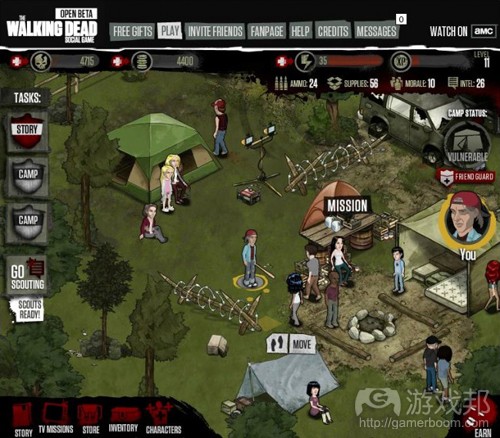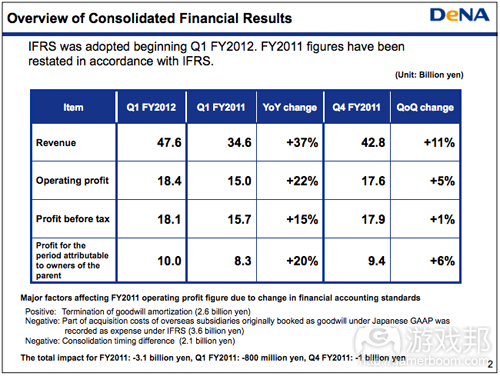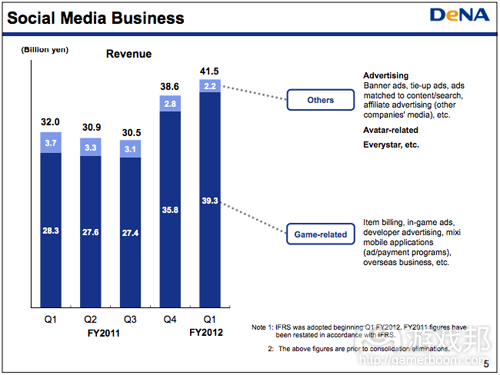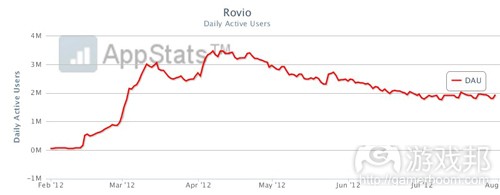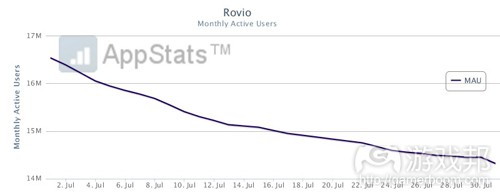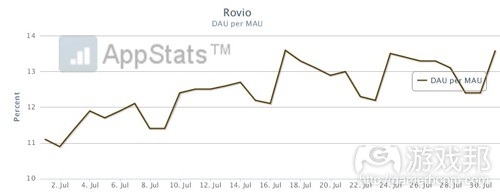每日观察:关注DeNA财报及游戏ARPDAU(8.10)
1)AMC与RockYou日前宣布向Facebook推出基于热门电视剧《行尸走肉》的社交游戏《The Walking Dead Social Game》,该游戏由Eyes Wide Games开发,现已进入公开测试阶段。
该游戏结合了策略、角色扮演和恐怖求生元素,其故事内容始于电视剧情的前几周,玩家在游戏中会被Shane Walsh拯救并送往幸存者集中营,他们会接收到来自其他营地成员的不同任务,其中多数与外出寻找供应物资有关。
玩家需使用战斗、潜行和干扰等方法避开僵尸,其游戏角色拥有精力,准确度和行动距离等属性。
据称该电视剧已获得可观的收视率,其改编漫画也持续获得好评,甚至赢得了埃斯纳奖(游戏邦注:这是是漫画界的奥斯卡,北美漫画产业中最有分量的奖项)。
2)据insidemobileapps报道,日本手机社交游戏巨头DeNA日前发布2012财年第1季度(截止2012年6月30日)报告显示,该时期公司销售额增长至476亿日元(6.09亿美元),同比上年增长37%,比上季度增长11%。
营业利润达184亿日元(2.35亿美元)同比上季度增长5%,同比上年增长22%;净收益达100亿日元(1.271亿美元),同比上季度增长6%。DeNA社交媒体业务(包括其游戏部门及Mobage游戏平台)收益占415亿日元(5.274亿美元),在公司季度总销售额中占比87.2%。Mobage日本用户达4307万,超过上季度时的3900万。
与CyberAgent或Konami不同的是,kompu gacha机制被禁一事对DeNA收益并无太大影响。但需注意的是,该季度是DeNA的转型时期,它在6月22日才彻底移除了第一和第二方游戏中的kompu gacha盈利机制,而第三方游戏则是在6月底才弃用这一机制。
DeNA预计2012上半年公司收益为971亿日元(12.3亿美元),营业利润为379亿日元(4.817亿美元),净收益为214亿日元(2.719亿美元)。该公司目前股票售价为1810日元,比其全盛时期的4084日元下滑50%左右。
3)据insidemobileapps报道,2012年第一季度DeNA第一方游戏《Blood Brothers》及《Ninja Royale》日活跃用户平均盈利(ARPDAU)最高可达到1美元,而其竞争对手Glu Mobile在6月份iOS平台上的ARPDAU则是6.1至13.2美分。
DeNA旗下的ngmoco首席执行官Neil Young曾在最近采访中表示,成熟手机社交游戏的ARPDAU一般是每天15-25美分,但DeNA的ARPDAU比一般数值高3-6倍左右。
除此之外,DeNA还透露虚拟货币Moba-coin在7月份销售额将近1000万美元,其中多数归功于iOS和Android游戏《Rage of Bahamut》(游戏邦注:该游戏在海外市场用户已达300万)。该游戏多次在iOS应用营收榜单登顶,有17周时间是Android应用营收榜单冠军。
但该公司为实现发展也投入了大量营销成本。据其财报显示,DeNA在第一季度的销售、推广和广告投入高达54亿日元(6860万美元),同比去年增长10%,比上季度增长23%。
4)socialgamesobserver最近发布《愤怒的小鸟》登陆Facebook以来的相关数值显示,该游戏于2012年情人节上线并于4月份达到高峰,当时的MAU为2400万,DAU将近350万。
但在4月底之后,该游戏用户流量持续下滑,在7月份流失了150万MAU(从原先的1530万降至1380万),不过其DAU数值一直较为稳定。这意味着该游戏DAU/MAU比值较为乐观,用户粘性较大,更有利于开发商从中盈利。
5)据venturebeat报道,Facebook最近更新的开发者政策显示,Facebook虽然关心平台应用开发者,但它更关心自己的数据。
这一新政策指出,开发者不可在未经Facebook许可的情况下,将平台用户数据导入其他社交网站;Facebook应用不可绑定、链接、推广、发布或重定向到其他竞争对手的社交网站中。(本文为游戏邦/gamerboom.com编译,拒绝任何不保留版权的转载,如需转载请联系:游戏邦)
1)The Walking Dead Social Game’s open beta lurches onto Facebook
Mike Thompson
AMC and RockYou today announced The Walking Dead Social Game, developed by Eyes Wide Games, has launched on Facebook in open beta.
The Walking Dead Social Game is based on AMC’s hit show, in turn based on Robert Kirkman’s long-running comic series following the journey of Rick Grimes and a fluctuating cast of survivors as they navigate through a post-zombie apocalypse world. The game’s story begins a few weeks prior to the TV show’s pilot episode, with players being rescued by Shane Walsh and brought back to the survivor’s camp he leads. Players receive various missions from other camp members, which seem to largely be based around going out into the world to scavenge for supplies.
The game is a mixture of strategy, role-playing and survival horror genres, with players using combat, stealth and distraction to fend off or avoid “walker” zombies (so named because they roam around the landscape). Players go out in the world and engage in turn-based fights with zombies, starting out with simple melee weapons and gradually acquiring firearms from the in-game store. As experience is earned in the title, characters can have attributes like stamina, accuracy and movement range upgraded. Meanwhile, players can return to the survivor camp in between missions to rest, further the story and spend experience points.
There seems to be an option to play co-operatively, but none of our friends are in the game yet, so we can’t fully comment on these mechanics. That said, some zombies that appear in missions are labeled as friends and we’re invited to share game invites with those people once we’ve killed their undead avatars.
When we first heard about The Walking Dead Social Game, the original release date was planned for sometime in April. That date came and went and not much was said about the game until now.
Although the show isn’t schedule to start back up again until October, the comic series has recently been enjoying a significant amount of attention because its one hundredth issue just came out last month and was recently featured in the digital comics app ComiXology.
Facebook games that tie-in to TV shows aren’t massively popular on the social network, but they can do brisk business if attached to the right brand. On one hand, games like Being Human and Spartacus: The Game have mostly faded from public view after brief stints in the limelight, while titles like CSI: Crime City and House M.D.: Critical Cases are still enjoying well over 100,000 daily active users.
The Walking Dead Social Game will probably land among, and possibly surpass, titles in the latter category. This is because The Walking Dead is a very strong brand, with the show having set several viewer records for AMC and the comic series being constantly praised by critics and even winning an Eisner Award.(source:insidesocialgames)
2)Unaffected yet by kompu gacha ban, DeNA revenues climb to new record, hitting $609 million in Q1 2012
Kathleen De Vere
Monetization So far Japanese mobile-social gaming giant DeNA seems to have emerged largely unscathed from the ban on the kompu gacha monetization mechanic, reporting its highest ever quarterly revenues for Q1 2012. Sales climbed to 47.6 billon yen ($609 million) during the quarter ending June 30, 2012 — up 37 percent year-over-year and 11 percent quarter-over-quarter.
Operating profit climbed 5 percent quarter-over-quarter and 22 percent year-over-year to 18.4 billion yen ($235 million), while net income rose six percent quarter-over-quarter to 10 billion yen ($127.1 million). DeNA’s social media business — which includes its gaming division and the Mobage gaming network — accounted for 41.5 billion yen ($527.4 million), 87.2 percent of the company’s total sales for the quarter. Mobage Japan now has 43.07 million users, up from the 39 million users the company reported last quarter.
Although the company’s operating profit margin declined slightly quarter-over-quarter, falling from 41 percent to 38.6 percent, Moba-coin consumption was up quarter-over-quarter. 44 percent of all Moba-coins purchased were consumed on smartphones during July, up slightly from the 40 percent average the company reported for Q4 2011.
Unlike the most recent earnings reports from CyberAgent or Konami, the elimination of kompu gacha — a monetization mechanic that heavily incentivized the purchase of randomly generated virtual goods — from DeNA’s stable of mobile-social games didn’t seem to have much of an impact on the company’s earnings. That’s extremely good news for DeNA, considering it declined to include a performance forecast for Q1 2012 with its last earnings report, stating it was unable to determine the impact the ban would have on its business.
However, it’s important to note this quarter was one of transition for DeNA. The company only stopped using kompu gacha mechanics in its first and second party games at the end of May, while third-party games continued to use the mechanic until the end of June. DeNA phased out all “kompu gacha-like” monetization mechanics in its first and second-party titles on June 22, with third-party games eliminating them by the end of June. DeNA is also making the odds of receiving virtual goods clear through in-game displays, a process that will be implemented across the company’s first, second and third party games by the end of August.
What all this means is that while DeNA still reported record sales for Q1 2012, Q2 will be the true indicator of how its business can do without some very lucrative monetization mechanics.
DeNA is forecasting Moba-coin consumption will reach 55 billion in Q2, a modest 1.6 percent increase over Q1’s sales. For the first half of 2012, DeNA is estimating it will see 97.1 billion yen ($1.23 billion) in revenue, good for 37.9 billion yen ($481.7 million) in operating profit and 21.4 billion yen ($271.9 million) in net income.
The company’s shares were up 0.17 percent today, and are currently trading at 1,810 yen, but are still down almost 50 percent from their one year high value of 4,084 yen.(source:insidemobileapps)
3)DeNA is seeing ARPDAU near $1 in its North American games
Kathleen De Vere
DeNA’s first party titles Blood Brothers and Ninja Royale saw peak average revenue per daily active user (ARPDAU) of about $1 during Q1 2012. For reference, in June DeNA competitor Glu Mobile reported its games were seeing ARPDAU in the rage of 6.1 cents to 13.2 cents on iOS.
In a recent interview with Inside Mobile Apps, ngmoco CEO Neil Young said that while mature mobile-social game company typically sees ARPDAU in the range of 15 to 20 cents a day, some DeNA is able to drive ARPDAU 3 to 6 times higher than normal, a claim that’s been backed up by the company’s Q1 2012 earnings report.
In addition to its impressive ARPDAU figures, DeNA has also revealed Moba-coin sales reached almost $10 million dollars in July– a figure the company credits to the success of its iOS and Android title Rage of Bahamut. That game has been the top grossing iOS app several times and held the top grossing spot on the Android app charts for more than 17 weeks now. According to Young, the title is making more money now than when it first topped the charts back in April.
The company’s impressive growth is coming at a price however; DeNA revealed it is growing its North American user base through “intensive marketing” — a strategy we’ve heard has been driving user acquisition costs up to record highs. According to its first quarter earnings report, DeNA spent 5.4 billion yen ($68.6 million) on sales, promotion and advertising expenses during Q1. That’s an increase of 10 percent year-over-year and 23 percent quarter-over-quarter. This means that while DeNA is seeing some extraordinary earnings figures already, it may not be in a position to recoup its user acquisition and advertising costs in North American for some time to come.(source:insidemobileapps)
4)Rovio and Angry Birds’s Facebook Performance
By Sebastian Sujka
The biggest Scandinavian Facebook developer, Finland-based Rovio, launched its success game Angry Birds on Facebook Valentine’s Day 2012. After a phenomenal launch the game peaked in late April at 24,000,000 monthly active users and almost 3,500,000 daily active users. The success of the launch was no surprise due to the huge brand awareness of the Angry Birds franchise. We took a closer look on what happened ever since.
End of Arpil onwards, Rovio and Angry Birds are on a constant decline when it comes to the number of Facebook users. Rovio lost 1,500,000 monthly active users just last July (from 15,300,000 million to 13,800,000 million).
Having a closer look at the stats one can see that the development is not overall negative. Rovio might have lost many MAU (monthly active users) but constantly maintained the same number of DAU (daily active users).
Rovio will probably not mind the decline in MAU too much as DAU is the currency that counts for social game developers: Daily active users are typically the ones that are spending money in the game.
Due to the DAU and MAU developments we see an increase of stickiness for Rovio. The Sticky Factor is the ration of DAU/MAU and tells you how many of the monthly active users are turned into daily active users. If your sticky factor is 15% it means that 15% of your monthly active users are daily active users and also gives you a good estimate how many of newly acquired users will be turned into daily active users.(source:socialgamesobserver)
5)Facebook loves developers … but not quite as much as it loves its user data
John Koetsier
Facebook “Operation Developer Love” — Facebook’s effort to win the hearts and minds of the app-developer community — is in full swing. The company recently delivered some cool updates for developers on payments reporting, subscriptions for apps, a beta program for mobile apps in ads, and a refreshed iOS software development kit.
But a new update to Facebook’s developer policies shows that, while Facebook certainly does love its developers, it loves its data just a little bit more.
As Facebook said in a post on the Developer blog last night:
We’ve updated our policies to further clarify that Facebook Platform cannot be used to export user data into a competitive social network without our permission. Facebook Platform is designed to enable rich social apps, and should not be used as a data export tool. As we explained in September, we offer Download Your Information for users wanting to export their data from Facebook.
But the policy goes a little farther than that. Not only are developers not permitted to export data — which one might think is a reasonable, if hard-core competitive restriction — they also aren’t allowed to link to any of their apps on other platforms.
As the relevant sections of the full policy state:
Competing social networks:
(a) You may not use Facebook Platform to export user data into a competing social network without our permission;
(b) Apps on Facebook may not integrate, link to, promote, distribute, or redirect to any app on any other competing social network.
In other words: Facebook apps should only know about Facebook. And perhaps, if you stretch the meaning of the word “promote,” that could be taken to mean: Don’t even mention your apps on other social networks. Thus ensuring that a Facebook app’s users are Facebook’s users first and foremost … and only secondarily the developer’s users.
It’s not surprising, and it is simply a continuation of an ongoing trend, but it does show a certain insecurity that, before the Great Facebook Stock Debacle of 2012, I’m not sure we would have seen.
That is why they call it a platform, and that is why is it good to be king.(source:venturebeat)

























